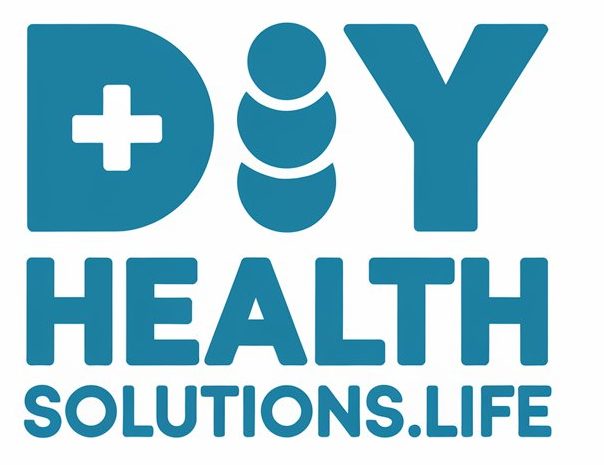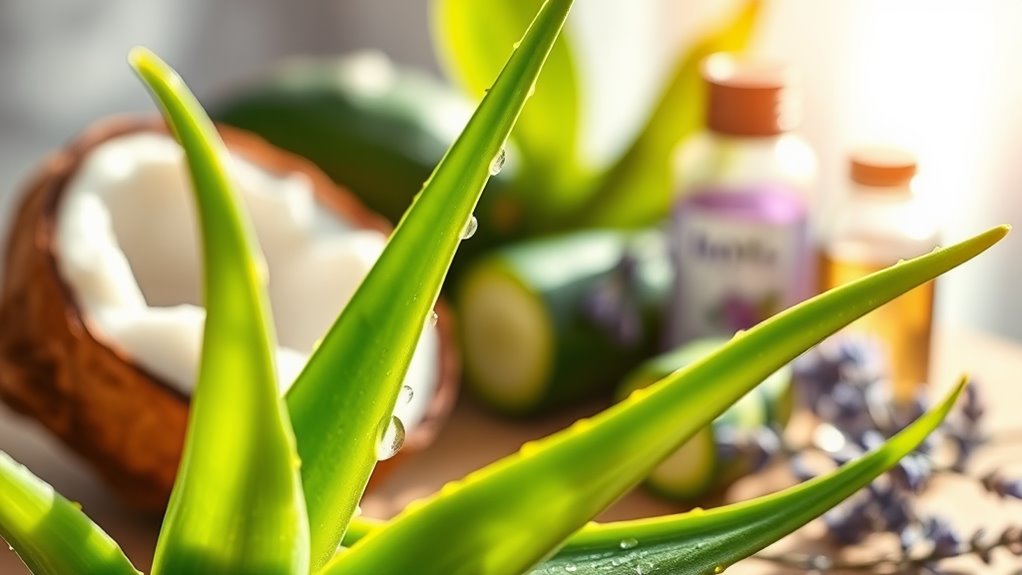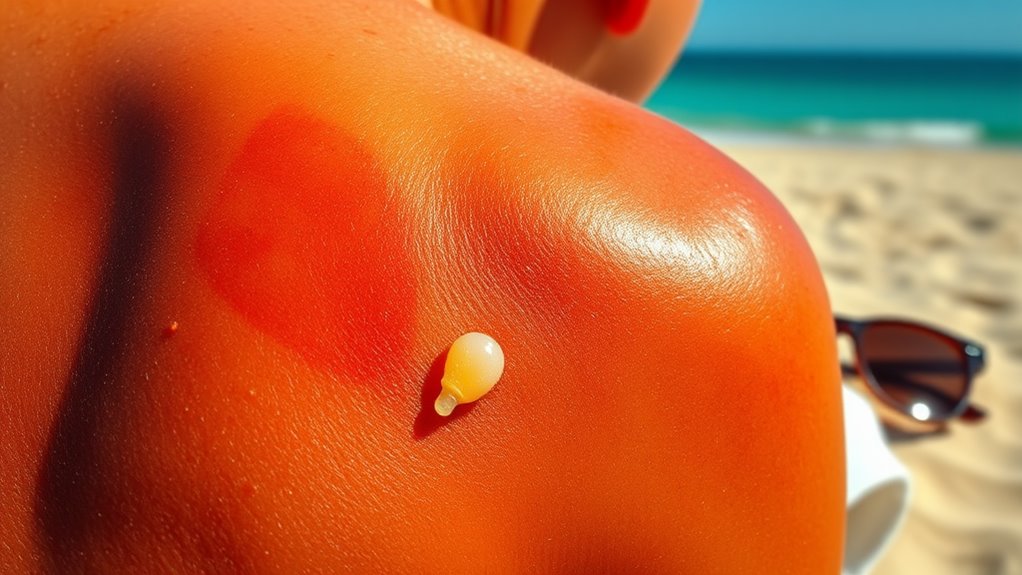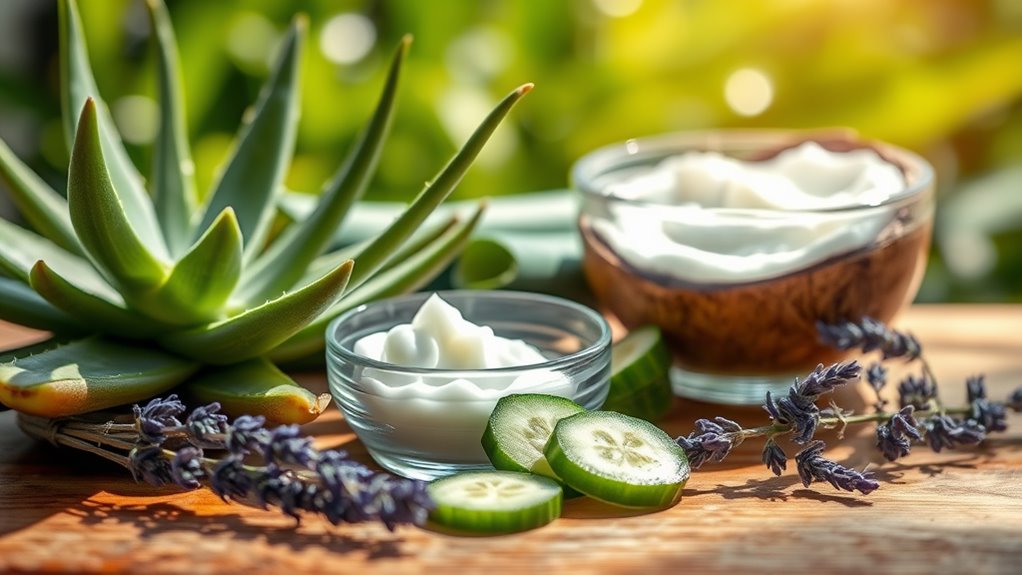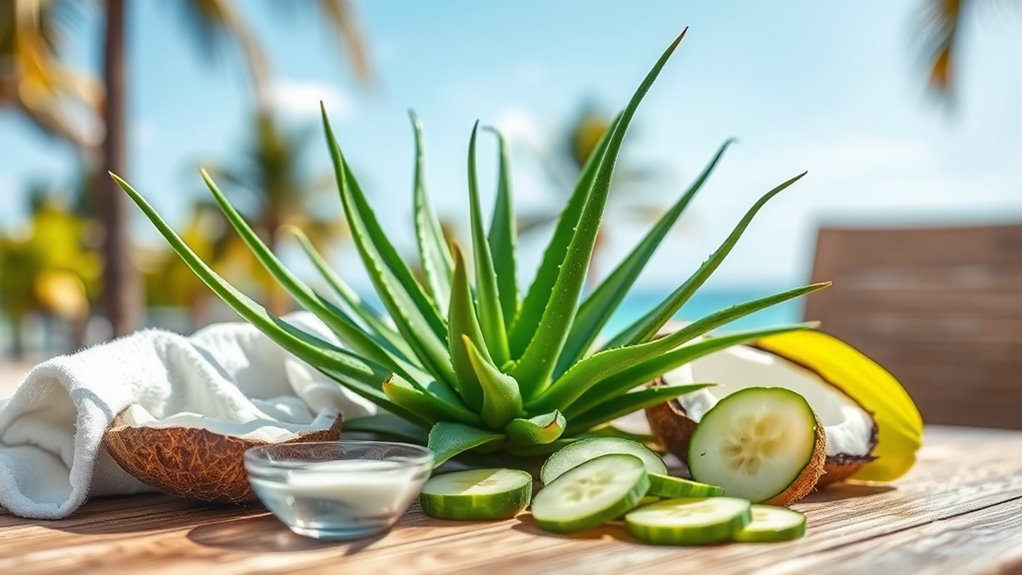The Ultimate Guide to Sunburn Remedies That Work Instantly
If you’ve got a sunburn, immediate relief is essential. Start with over-the-counter treatments like aloe vera gel or hydrocortisone cream to reduce inflammation and soothe your skin. Nonsteroidal anti-inflammatory drugs, like ibuprofen, can help with pain. For natural remedies, consider applying coconut oil or taking an oatmeal bath, which calms irritated skin. A cold compress can also ease swelling. Always remember to use broad-spectrum sunscreen in the future to prevent further damage. Each remedy has its benefits, and exploring them can enhance your recovery experience effectively.
Key Takeaways
- Apply aloe vera gel directly to sunburned skin for instant cooling relief and inflammation reduction.
- Use cold compresses to immediately soothe burning sensations and reduce swelling.
- Take NSAIDs like ibuprofen or aspirin to relieve pain and inflammation quickly.
- Coconut oil can moisturize and protect healing skin while alleviating discomfort.
- Oatmeal baths calm irritated skin and provide immediate relief from sunburn symptoms.
Understanding Sunburn Symptoms
How can you tell if you’ve got a sunburn? The signs often appear within a few hours after sun exposure, primarily caused by ultraviolet (UV) radiation. You might notice your skin turning red and feeling warm to the touch.
In more severe cases, blisters can form, and you could experience pain or swelling. Keep an eye out for peeling skin as well, which can occur a few days later as part of your skin’s healing process.
The severity of sunburn symptoms varies depending on the intensity of the sun exposure and your skin type. For instance, fair-skinned individuals are generally more susceptible to sunburn causes.
Additionally, you may experience systemic symptoms like fever, chills, or nausea if the burn is particularly severe.
Understanding these symptoms is vital for managing your condition effectively. Once you’ve identified a sunburn, you can take steps to alleviate discomfort and promote healing.
Recognizing the signs early can help prevent further damage and encourage your skin to recover more efficiently. Remember, protecting your skin from UV rays is essential, so always consider preventive measures for future outdoor activities.
Top Over-the-Counter Treatments
When dealing with a sunburn, effective over-the-counter treatments can considerably ease discomfort and promote healing. One of the most recommended options is topical creams containing aloe vera or hydrocortisone.
Aloe vera is known for its soothing properties and can help reduce inflammation while providing a cooling sensation. Hydrocortisone creams, available in low strengths, can also alleviate redness and swelling.
For immediate pain relief, consider using non-steroidal anti-inflammatory drugs (NSAIDs) such as ibuprofen or aspirin. These medications not only help reduce pain but also decrease inflammation, allowing you to feel more comfortable as your skin heals.
Additionally, look for specialized sunburn relief gels that often contain ingredients like lidocaine. These gels can numb the affected area, providing quick relief from the stinging sensation commonly associated with sunburns.
Finally, don’t forget to hydrate your skin with moisturizers after applying these treatments. Products containing glycerin or hyaluronic acid can help lock in moisture, promoting faster healing.
Always follow the instructions on the packaging and consult a healthcare professional if your symptoms worsen or don’t improve.
Effective Home Remedies
Effective home remedies can provide relief for sunburn discomfort and support the healing process. Utilizing natural ingredients can soothe your skin and promote recovery. Here are some effective options:
-
Aloe Vera: This well-known remedy has anti-inflammatory properties that can cool and hydrate your skin. Apply fresh Aloe Vera gel directly to the affected area for instant relief.
-
Coconut Oil: Rich in fatty acids, Coconut Oil can help moisturize and protect your skin as it heals. Gently massage it onto the sunburned areas once the initial heat has subsided.
-
Cold Compress: Applying a cold, damp cloth can reduce swelling and ease the burning sensation. Make sure not to apply ice directly to your skin.
-
Oatmeal Baths: Soaking in a lukewarm oatmeal bath can provide soothing relief. Add finely ground oats to your bathwater to help calm irritated skin.
-
Green Tea: Brewed green tea contains antioxidants that can help repair your skin. After it cools, apply it to your sunburn with a soft cloth.
With these remedies, you can alleviate discomfort and support your skin’s healing journey.
Natural Soothing Ingredients
Numerous natural ingredients can provide soothing relief for sunburned skin. One of the most effective is aloe vera. Its cooling properties help reduce inflammation and provide moisture, which is essential for healing. Studies show that aloe vera can accelerate skin recovery, making it a go-to remedy for sunburn. Simply apply pure aloe vera gel directly to the affected areas several times a day to experience its benefits.
Coconut oil is another excellent option. Rich in fatty acids, it hydrates and nourishes the skin, promoting healing while preventing further dryness. Research indicates that coconut oil can also possess anti-inflammatory properties, which may alleviate pain and redness associated with sunburn. To use coconut oil, wait for the initial heat of the burn to subside, then gently massage it onto the skin.
Combining these two natural ingredients can enhance their soothing effects. Create a mixture using equal parts of aloe vera gel and coconut oil for an effective, calming treatment.
Prevention Tips for Future Sunburns
After addressing sunburn with soothing remedies, it’s important to focus on prevention to avoid future damage.
Taking proactive steps can greatly reduce your risk of sunburn and long-term skin issues. Here are some effective tips to keep in mind:
-
Apply sunscreen: Use a broad-spectrum sunscreen with at least SPF 30, applying it generously on all exposed skin. Reapply every two hours, or more often if swimming or sweating.
-
Choose protective clothing****: Wear long sleeves, wide-brimmed hats, and sunglasses with UV protection. Fabrics labeled with UPF offer added defense against harmful UV rays.
-
Seek shade: Whenever possible, stay in shaded areas, especially during peak sun hours (10 a.m. to 4 p.m.).
-
Limit sun exposure: Gradually increase your time outdoors to help your skin adapt to sunlight without burning.
-
Stay hydrated: Drink plenty of water to keep your skin healthy and resilient against sun damage.
Frequently Asked Questions
Can Sunburn Worsen After the Initial Day of Exposure?
Yes, sunburn can worsen after the initial day. As the sunburn progresses, you may notice increased redness intensity and swelling, often revealing deeper skin damage. Monitor your skin closely for any worsening symptoms or discomfort.
How Long Does Sunburn Typically Take to Heal?
Sunburn healing typically takes about three to six days, depending on the severity. You’ll notice redness subsiding and peeling occurring as part of the healing timeline, indicating your skin’s recovery process is underway.
Are There Any Foods That Help Heal Sunburn?
Yes, certain healing foods can aid sunburn recovery. Incorporate fruits like watermelon and oranges for skin hydration, along with leafy greens and fatty fish, which provide essential nutrients that promote healing and reduce inflammation.
When Should I See a Doctor for Sunburn?
You should see a doctor for severe sunburn symptoms, like blisters, fever, or intense pain. They can assess your condition and discuss treatment options to promote healing and prevent complications effectively. Don’t hesitate to seek help.
Can Sunburn Cause Long-Term Skin Damage?
Yes, sunburn can cause long-term skin damage. Repeated UV exposure affects your skin health, increasing risks of premature aging and skin cancer. Protecting your skin is essential to prevent lasting effects from sunburn.
